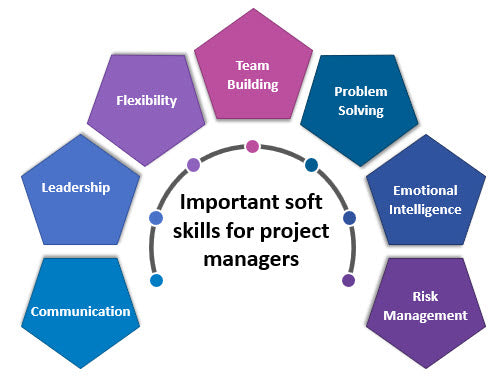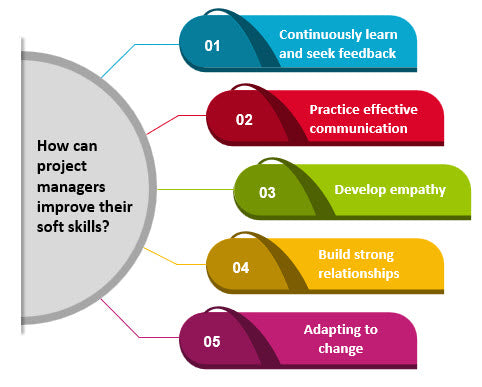The Importance Of Soft Skills For Project Managers
Soft skills are essential for project managers to succeed in their roles. While technical skills, such as budgeting and scheduling, are important, it’s the ability to effectively communicate, motivate, and collaborate with team members that sets top-performing project managers apart. In this article, we’ll discuss the importance of soft skills for project managers and how they can enhance their abilities in these areas. We’ll also explore the specific soft skills that are most valuable to project management success.

What Are Soft Skills?
Soft skills refer to personality traits, attitudes, habits, and social abilities that enable individuals to interact effectively with other people, to complete tasks, and to work collaboratively. Some common soft skills include communication, teamwork, time management, problem-solving, leadership, adaptability, creativity, empathy, and conflict resolution. These abilities are often considered equally important as technical skills in the workplace and are valued in almost every profession. Soft skills are essential for building positive relationships with colleagues, clients, and customers, enhancing productivity and efficiency, and fostering a healthy work environment. They can also help individuals advance in their careers and achieve personal goals.
Effective communication involves conveying information clearly and efficiently, listening actively, and responding appropriately to feedback. A team player is someone who cooperates with others, contributes to group projects, and respects different perspectives. Time management skills ensure individuals are able to prioritize tasks, manage deadlines, and complete projects on time. Problem-solving and decision-making require the ability to analyze and evaluate situations, identify solutions, and make appropriate choices. Leadership involves the ability to inspire and motivate others, delegate tasks effectively, and act with integrity.
Adaptability is an important trait that enables individuals to be flexible and adapt to changing situations. Creativity involves thinking outside the box to develop innovative solutions. Empathy allows individuals to understand and connect with others on an emotional level, while conflict resolution skills enable people to resolve disputes and work through challenges in a constructive manner.
Why Are Soft Skills Important For Project Managers?
Soft skills are important for project managers because project management is not just about planning, scheduling, and organizing tasks. It also involves interacting with team members, stakeholders, and clients to communicate project goals, manage conflicts, and build relationships. Some of the reasons why soft skills are important for project managers include:
- Effective Communication: Project managers need to communicate with team members, stakeholders, and clients to ensure that everyone is on the same page. Effective communication skills can help project managers convey complex ideas in a clear and concise manner.
- Leadership and Management: Project managers need to lead and manage teams to ensure that projects are completed on time and within budget. Soft skills such as assertiveness, empathy, and emotional intelligence can help project managers motivate and inspire their teams.
- Managing Conflicts: Conflicts can arise during projects, and it is the project manager's responsibility to manage them effectively. Soft skills such as active listening, negotiation, and diplomacy can help project managers resolve conflicts and maintain a positive work environment.
- Time Management: Project managers need to manage their time effectively to ensure that projects are completed on schedule. Soft skills such as prioritization, delegation, and multitasking can help project managers manage their time and stay focused on achieving project goals.
What Are Some Of The Most Important Soft Skills For Project Managers?
- Communication: The ability to communicate with stakeholders and team members clearly and effectively.
- Leadership: The ability to inspire and guide team members towards achieving goals.
- Time Management: The ability to manage time efficiently and prioritize tasks effectively.
- Flexibility: The ability to adapt to changing circumstances and be open to new ideas.
- Conflict Resolution: The ability to resolve conflicts among team members in a positive and mutually beneficial manner.
- Team Building: Building and fostering a strong team culture and relationships.
- Problem Solving: The ability to identify and solve problems in a creative and effective manner.
- Emotional Intelligence: The ability to understand and manage one's own emotions and those of others.
- Negotiation: The ability to negotiate effectively with stakeholders and team members.
- Risk Management: The ability to identify and mitigate potential risks and develop contingency plans.

How Can Project Managers Improve Their Soft Skills?
- Continuously Learn and Seek Feedback: Project managers should never stop learning and should continuously seek feedback to identify areas that need improvement. Regular feedback from team members can help project managers understand what areas they need to focus on and improve.
- Practice Effective Communication: Effective communication is essential for project managers to successfully manage a project. They should practice active listening, keep their messages clear and concise, and communicate with different stakeholders in a way that suits their specific needs.
- Develop Empathy: Project managers should develop empathy and try to understand the emotions and needs of team members, stakeholders, and clients. Empathy helps to build better relationships that lead to better collaboration and more successful projects.
- Build Strong Relationships: Building strong relationships with team members, stakeholders, and clients is crucial for project success. Project managers should try to get to know team members personally and work on building trust and respect.
- Adapting to Change: Flexibility and adaptability are critical skills that project managers should develop. By being adaptable, they can work more effectively with different team members and adjust the project plan as necessary.
Conclusion
In conclusion, soft skills are integral to project management success. Along with technical skills, project managers require proficient interpersonal and communication skills to effectively lead and manage their teams. Soft skills such as leadership, team building, conflict resolution, and adaptability play a crucial role in building a positive project culture and ensuring the project's success. Furthermore, soft skills enable project managers to effectively manage stakeholders and build relationships, making them indispensable assets to any project team. Ultimately, the development and cultivation of soft skills will not only enhance a project manager's career progression but also contribute to the most successful project outcomes.




